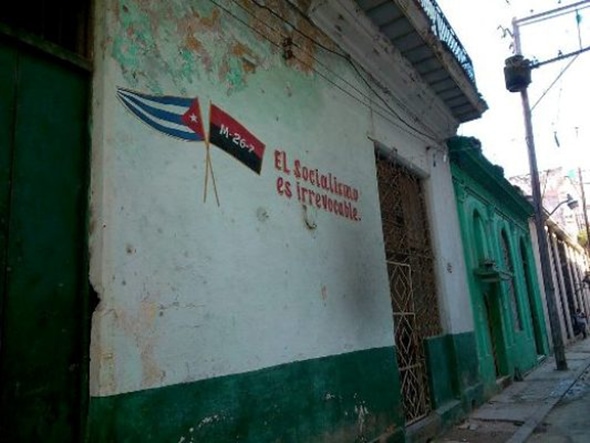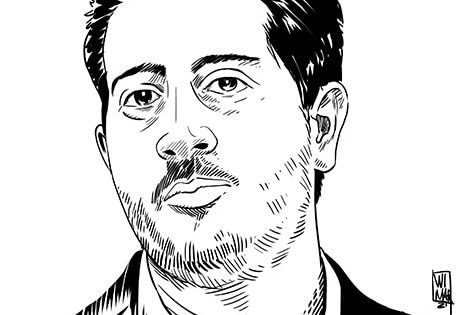José Peralta, the 2013-2014 Scotiabank / CJFE Journalism Fellow, interviews Cubans who, although happy with ongoing economic changes, acknowledge that freedom of expression is still an issue in Cuba, where the Castro regime has been in power since 1959.
Arturo is in his thirties. He has a great smile and a knack for identifying hungry tourists.
That is his job. He tries every night to convince wandering groups that the restaurant where he works is the best option in town. He never loses his smile while speaking.
I’m seduced by his promises of fresh lobster and nice rum, and while we stroll the block and a half distance to the restaurant I try to shift the conversation.
“So why are all the roads destroyed, with huge holes and tunnels?” I ask.
“Oh, we are very happy with that, Raul (for Raul Castro, Fidel’s brother and current president of the country) is changing all the pipelines and we’ll have better services,” he says.
“Is that change reflected in your freedom to express yourself?”
His smile vanishes.
“Well, no. There nothing has happened, and I doubt it will ever happen.”
Arturo is one of many Cubans who, although happy with ongoing economic changes, acknowledge that freedom of expression is still an issue in Cuba, where the Castro regime has been in power since 1959.
Cuba is known as one of the worst countries to be a journalist in the world. Jail, repression, torture, beatings and murders are just some of the known punishments meted out to dozens of journalists and dissidents seeking to express a critical view of the government.
More than half a century has passed since Fidel Castro assumed power, but little has changed since his revolution ended in 1959. In a recent report presented to the Inter American Press Association’s Press Freedom Committee, dissident Cuban blogger Yoani Sanchez wrote that “freedom of the press, of expression and of association in Cuba continue without improvement, despite the economic reforms, and meanwhile official repression with paramilitary characteristics is gaining ground against those who seek to demonstrate their political discrepancies.”
Citing a specific example of such repression, Sanchez referred to an incident in October 2013, wherein “five independent journalists were arrested and held for several days, later to be released. The arrests occurred within the framework of the second anniversary of the death of the leader of the Ladies in White, Laura Pollán, and had as their objective preventing reports on the remembrance activities.”
Day Tripping
I went to Havana this month and I had the opportunity to converse with several Cubans about this issue. Workers, cab drivers, people in the street, all were afraid to talk about freedom of speech. One said that, at least, now they can talk to tourists without fearing they could be spies who’d report them to the police for being “counterrevolutionaries”—a term commonly used to label anyone that’s not in line with the official point of view.
“Obviously, we may talk a bit more, but no way I’m writing anything down about it”, said Yuniesky, a cab driver from Havana. In Cuba it’s not uncommon to find people with Russian names like Yuniesky or Alexander or Ivan, an old tradition from the days of the country’s close ties to the Soviet Union.
I’m being driven through the wealthiest neighbourhood in Havana, where embassies, five star hotels and the houses of top government officials are located. Another cab pulls up next to us and the two drivers have a very quick conversation: they are meeting on the 27th for a birthday party, but no music will be played.
The explanation for this strange occurrence is shockingly simple.
“My wife’s nephew died last week trying to escape from the island in a homemade ship. That’s why we won’t play music,” the driver says. “We cannot talk about these things, and people are still being jailed if they dare to express too loudly.”
This hostile climate for free expression is known around the world. Reporters Without Borders places Cuba at 171 among the 179 countries ranked on their 2013 World Press Freedom Index. Since the creation of the index, the Caribbean country has consistently been situated within the 10 worst countries in the world.
Raul Castro’s promises of greater openness have been partially fulfilled. There are more private stores, supermarkets, and shopping centres for tourists than at any other time during the Castro regime. However, a loosening of restrictions on free expression has sadly not followed suit.
Is there any hope of change? People are doubtful. They see hope in the Internet and the ability of younger generations to bypass censorship using new technologies, but risks are still high. Substantive change is unlikely to come from above; it will be up to the imagination and inventiveness of the Cuban people.
José Peralta is the 2013-2014 Scotiabank / CJFE Journalism Fellow at Massey College.
This article was originally published on cjfe.org on 12 December 2013.



